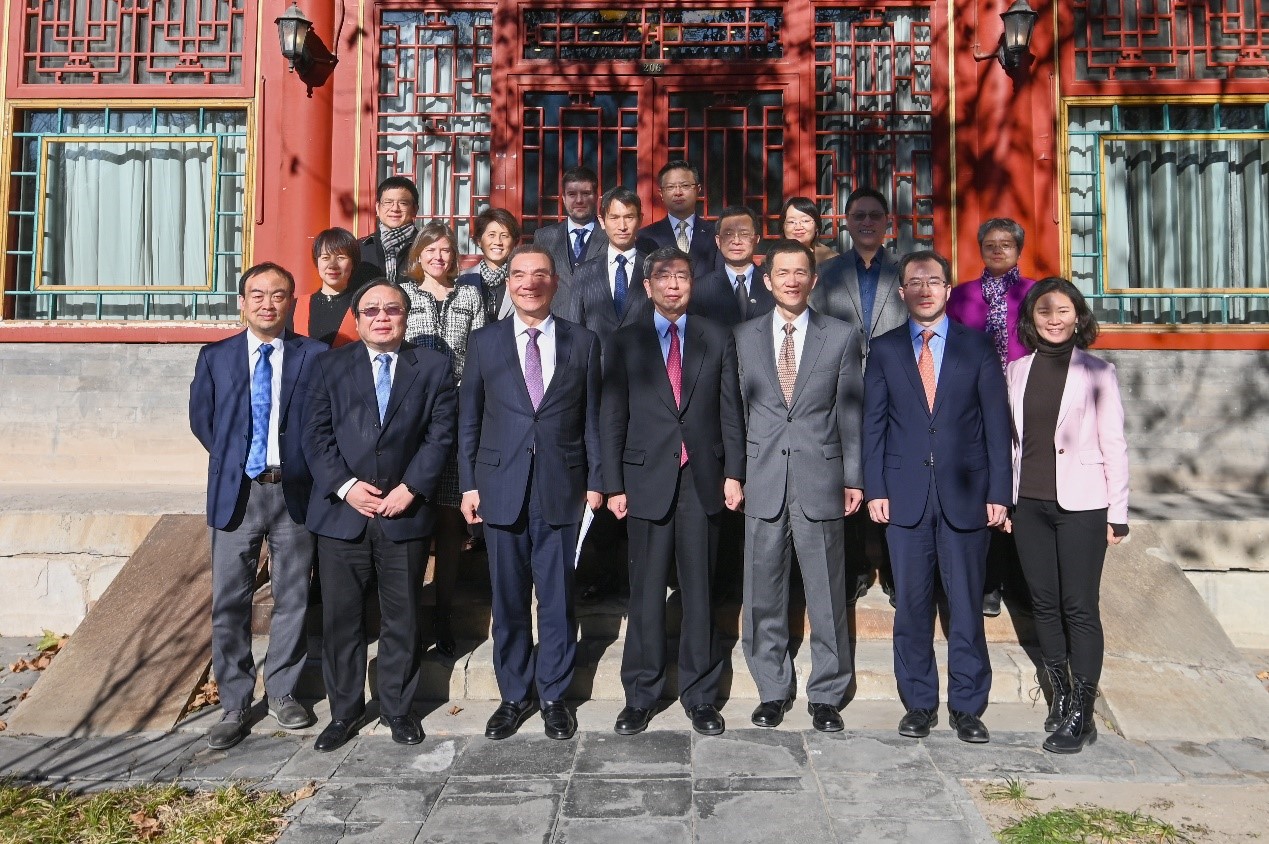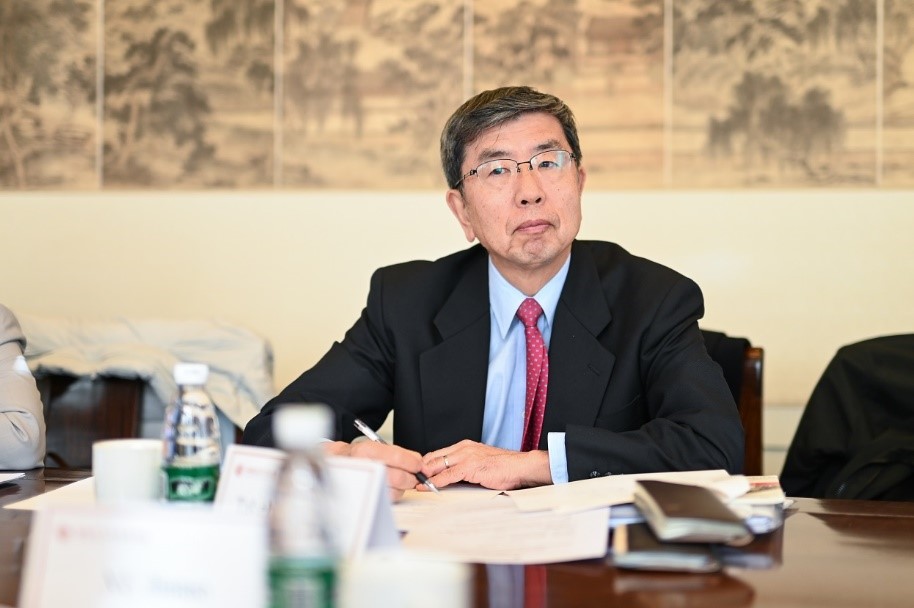ADB President visits NSD and ISSCAD to discuss Asia’s journey to prosperity
Dec 12, 2019
Peking University, Dec. 12, 2019: Asian Development Bank (ADB) President Takehiko Nakao and his team paid a visit to the National School of Development (NSD) and the Institute of South-South Cooperation and Development (ISSCAD) at Peking University on December 5. They also had a roundtable discussion with high-level academics on Asia’s road to development.
 Group photo
Group photo
The National School of Development, founded in 1994, prides for its rigorous academic inquiry and aims to tackle the most complex challenges in the developing world. The Institute of South-South Cooperation and Development, an affiliated institution with NSD, established in 2016 after the formal announcement of President Xi Jinping at the High-Level Roundtable on South-South Cooperation during the 70th Anniversary Celebration of the United Nations in New York in 2015. The ISSCAD aims at building a world-class educational institution to train high-calibers from public sectors as well as a vigorous knowledge-sharing platform among developing countries.
Professor Xu Jintao, associate dean of NSD hosted the roundtable discussion. Nakao first shared his views on Asia’s economic success in the past 50 years. Right after the Second World War, the Asia Pacific Region was the poorest region in the world, but now it has emerged as a center of global dynamism. The increasing share of the working-age population, favorable geographic conditions, paired with rapid technological progress and globalization in recent decades, are all contributing factors to the current success. Nakao mentioned that regardless of the above-mentioned external factors, Asia’s success essentially relied on markets and the private sector as engines of growth.
 Takehiko Nakao
Takehiko Nakao
Nakao then posed a question to the professors, “What are the driving forces of China’s continuous growth?” The professors shared their unique perspectives and drew insights from their research areas. Professor Zhang Xiaobo concluded that success is mainly due to a combination of some foundational factors and policy intervention. Back to the 1990s, China has a large group of abandoned labor and a huge domestic market. Additionally, a high fraction of the population is working-age labor force, which brings energy and high productivity to economic development. On the policy side, Deng Xiaoping initiated the policy of reform and opening-up, ensuring China’s involvement in the international market. Moreover, the marriage between the international market and the abandoned labor truly incentivize entrepreneurship. In the meantime, China also launched the rural and fiscal reform, which laid a solid foundation for developing private sectors. That’s why one can easily find mayors act like entrepreneurs in many cities across China.
Professor Lei Xiaoyan, an expert in labor economics and aging issues, echoed with what Professor Zhang Xiaobo said and added that the rapidly aging population is posing more complex challenges to future economic development. By 2025, China will enter into an aging society and face a serious labor shortage, which would essentially change the nature of work and companies need to invest in artificial intelligence equipment. Government officials need to take measures accordingly, such as adjusting the retirement policy and helping elderly workers adapt to new technologies, which brings new challenges to the management of public affairs. Professor Xu Jintao, Shen Yan, and Wang Min also shared thoughts based on their research experiences and expertise. Both sides enjoyed the intellectual conversation on Asia’s road to development and the discussion on the way forward.
Professor Justin Yifu Lin, founder of NSD and dean of ISSCAD, later joined the conversation. Lin shared his opinions on the East Asian success and his commitment to applying knowledge to serve the developing world. Both Nakao and Professor Lin brought up the Washington Consensus, which is a set of 10 economic policy prescriptions considered to constitute the "standard" reform package promoted for crisis-wracked developing countries by Washington D.C.-based institutions. Professor Lin argued that although the Washington Consensus is a solution, it does not apply to all countries given the complex international landscape. Professor Lin’s core insight is that developing countries are qualitatively different from developed ones. To understand the challenges of under-development, policymakers and development banks need to understand how the structure of employment and production is determined, particularly the large gaps between the social marginal products of labor in traditional versus modern activities. Moreover, it is significant to analyze how the obstacles that block structural transformation can be overcome. To conclude, Professor Lin believed that we need to go beyond conventional ways of success, because some so-called international best practices may not apply to some countries.
During the two hours of exchanges, Nakao and the ADB delegates appreciated NSD and ISSCAD’s commitments to serving the developing world with knowledge and training the top-notch economic talents. In the meantime, ADB reiterated its commitment to achieving a prosperous, inclusive, resilient, and sustainable Asia Pacific region and sustaining its efforts to eradicate poverty. ADB is also looking forward to future conversation with academics at these two Institutions.
Since the founding of ISSCAD in 2016, the institute has hosted several high-level officials from ADB as guests in its speaker series, including Woochong Um, director general of the Sustainable Development and Climate Change Department at Asian Development Bank, and Zhai Yongping, chief of Energy Sector Group, Sustainable Development and Climate Change Department. Students from ISSCAD have been keen to attend the speakers’ series and deeply appreciated the access to these impressive guests who have rich practical experiences in the development world. In the next stage, NSD and ISSCAD expect to have more knowledge exchange and intellectual dialogues with ADB.
Written by: Xiaowei Zhuang
Edited by: Huang Weijian

